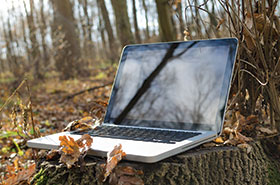

The coronavirus has triggered the world’s biggest work-from-home experiment. Millions of people have been asked to self-isolate to stop the virus from spreading. Entire regions in China and Italy were put under full or partial lockdown. With the virus spreading, major companies in the US and Europe, including Facebook and Amazon, are also asking employees to stay at home.
The current situation has reignited the discussion on the effectiveness and security of remote work. While many modern workplaces allow and even encourage working from home, opponents argue that remote work is less effective or even risky for business. How can employers ensure the productivity of their employees? How can companies protect their assets?
The first reports and comments from companies show that the experiment is working in some digital-based sectors. This experience showed that teams collaborate quite well even if they’re not in the same room. Some companies are also considering adding working from home as one of the benefits, as such work is cherished by many parents who say the ability to work from home makes it easier to juggle childcare and career.
At the same time, companies face many challenges, too. They need to ensure that employees have all the right access to the required documents and information. Besides, staff connecting from out of office may make mistakes that could cost companies millions. While working remotely, often on public Wi-Fi and on personal laptops, employees pose a severe threat to companies’ cybersecurity.
“The interest in our services has increased by 30-40%. We can see that companies are exploring various cybersecurity options to ensure both safe and productive work from home. Security is crucial, as hacks and data leaks don’t only bring financial loss – they may also mean lost customer trust and, in some cases, even bankruptcy. It’s important to note that employees’ errors are usually not deliberate. When working from home, people tend to be more relaxed and browse personal sites, which might not be secure,” says Daniel Markuson, digital privacy expert at NordVPN Teams.
Technological advancements have also made working from home more accessible across all sectors. “Nowadays, compared to 10 years ago, it is a lot easier to access emails, cloud-based filing, dial-in to calls and video conferencing remotely. All that makes work from out of office more accessible,” says Markuson.
Need to work from home because of the COVID-19 outbreak? Here’s a brief rundown of the tech tools you might find useful to replicate your office.
• Video conferencing software. Regardless of the benefits that remote working brings, it also might seem quite lonely. That’s where video conference comes in handy. Face-to-face meetings are much more productive than emails or chats, and video conferencing is an effective alternative.
• A webcam and a microphone. Essential tools for effective communication, most likely already installed on your laptop.
• Virtual private network (VPN). VPNs, such as NordVPN Teams, encrypt the traffic and allow employees to access company servers.
• Messaging platform. Professional messaging platforms, such as Slack, make it quick and easy to communicate with co-workers. They also make file-sharing more instant and straightforward.
• Other necessary office software. It is essential to ensure that employees have all the essential tools such as Microsoft Office. By providing that, it will prevent people from downloading illegitimate software.
• PC/laptop. It’s best to use company-provided PCs and laptops. However, it might not be possible in all industries. Therefore employers need to make sure that the employees have the required antivirus, firewall, and other security software.
• Time management tools. It’s very easy to lose track of time in an informal environment. Many useful tools help the user organise the time and use it effectively.
© Technews Publishing (Pty) Ltd. | All Rights Reserved.